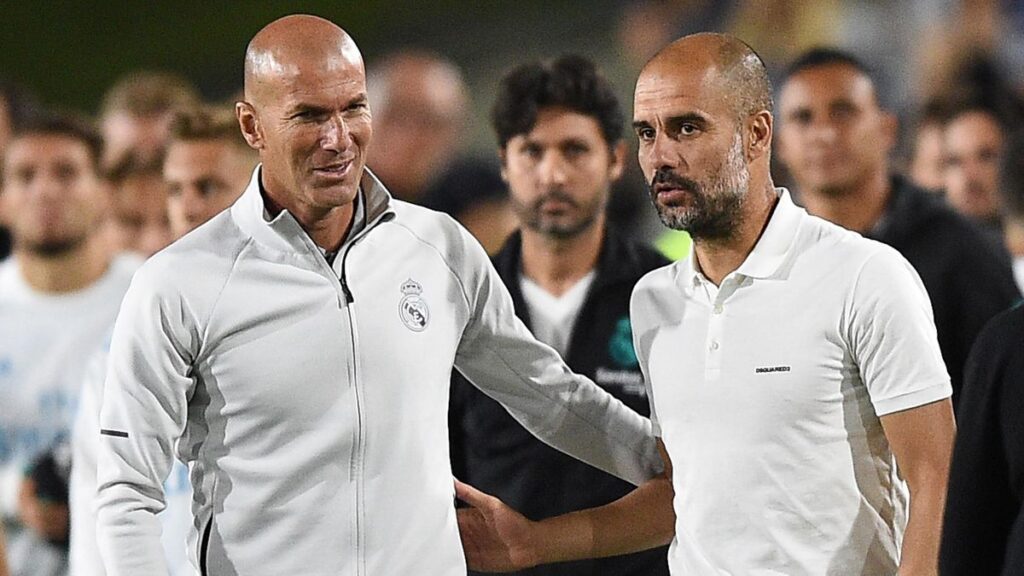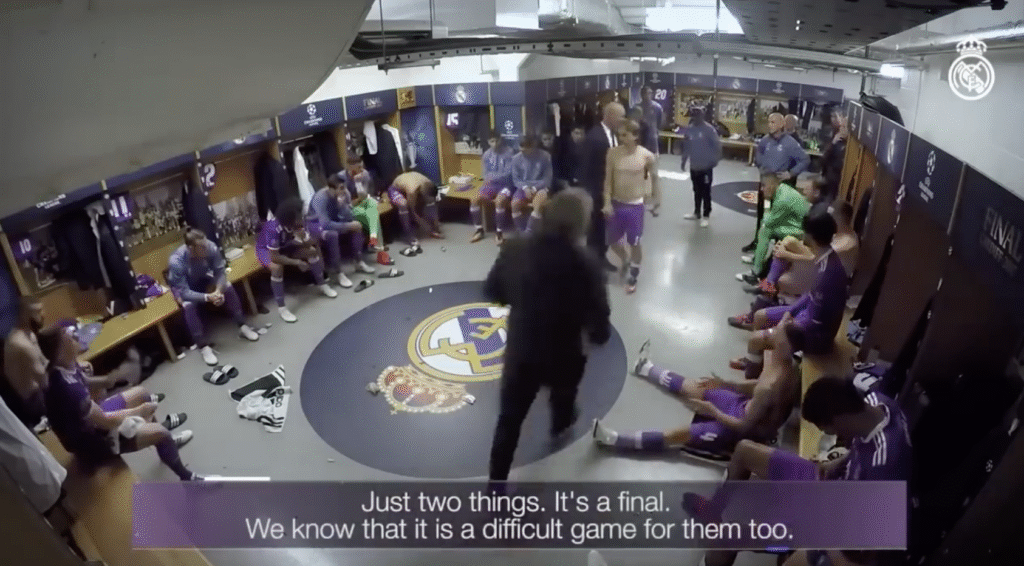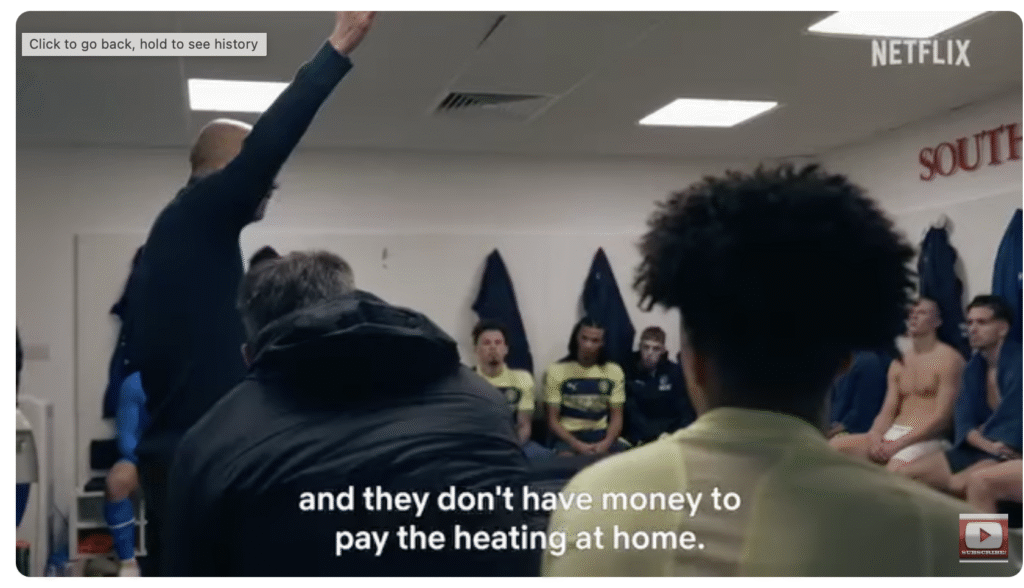- info@absolutefootballtraining.com
- Toronto, Ontario

The whistle blows. Fifteen minutes. Your players are catching their breath, emotions are running high, and the next 45 minutes could define everything you’ve worked for. This is the moment that separates legendary coaches from the rest, the half-time talk.
When Zinedine Zidane guided Real Madrid to three consecutive Champions League titles, his half-time talk became masterclass in champions communications. Similarly, Pep Guardiola’s Manchester City treble-winning season showcased a different but equally effective approach to half-time leadership. Both demonstrate how football coaching excellence is revealed in those crucial moments when champions are created.
Recent research from the International Journal of Sports and Exercise Psychology reveals that effective half-time talks significantly impact player performance, yet most coaches struggle to maximize this golden opportunity. The difference? Understanding the psychology behind what makes champions respond, just as these elite managers demonstrate consistently.
Analyzing the actual footage from Zidane’s 2017 Champions League final half-time talk reveals the essence of championship football coaching. As players gathered in Real Madrid’s locker room, Zidane’s approach was remarkably calm and methodical, a perfect example of how mental strength in football is cultivated through calm and composed leadership.
His opening words were very simple: “Just two things. It’s a final. We know that it is a difficult game for them too.” This is when Real Madrid faced Juventus in the Champions League final and Zidane demonstrated a fundamental principle of sports psychology, acknowledging the challenge while simultaneously building confidence through perspective. He kept it very simple and didn’t even mention a mistake that was done in the first half of the game.

Guardiola’s Passionate Brotherhood Approach
In strong contrast, Pep Guardiola’s half-time approach during Manchester City’s treble campaign revealed a different half-time speech which forged a different path to excellence. The footage from their crucial match shows Guardiola challenging his players with pointed questions: “Do you think it’s normal? The way you performed.” His approach combines accountability with brotherhood.
Guardiola’s approach lies in creating urgency while maintaining team unity. His powerful message to players during their treble run emphasized collective responsibility: “For the guys who travel and they don’t have money to pay the heating at home. To come here. To follow us. To perform in this way.” This demonstrates how personalized coaching extends beyond individual players to encompass community and purpose. He really says what he feels as apposed to always opting for a motivational talk.

Both coaches understood what research confirms: players experience heightened emotional states, elevated heart rates, and reduced attention spans during half-time. Yet their differing approaches show multiple paths to creating championship mindsets. The following are key psychological principles that both coaches employed:
The most successful coaches recognise that half-time isn’t just about football techniques, it’s about transforming mindset and unleashing potential that players didn’t know they possessed.
Examining both Zidane’s and Guardiola’s actual approaches reveals strategies that every coach can use:
Zidane’s Approach: “It’s a final” and “We know that it is a difficult game for them too.” This immediate context-setting demonstrates championship football coaching by acknowledging pressure while building collective confidence. He doesn’t just rant on about the first half. He sides with the players emotionally appealing to them that the game is difficult and he understands the emotional strain experienced during the game.
Guardiola’ Approach: “Do you think it’s normal? The way you performed.” He created immediate accountability through direct questioning, forcing players to self-assess and take ownership of their performance. He shows his true self and also says that which he feels on the spot. He’s not willing to hide and tell his players that everything will be alright. He is addressing the issue behind the first half game performance.
Both approaches develop mental toughness while maintaining team focus, showing how fundamental football skills include psychological preparation. They don’t blame a single player but rather create a team dynamic that unites the team more through accountability talk and emotional appeal.
Zidane’s Tactical Precision: “The most important thing for us is to be more aggressive in defense. I don’t mean aggressive so that you get booked. You just need to make sure you’re there, everyone needs to be a bit tighter and more aggressive.” Tactical advise that resonates with the players as they know exactly what he is talking about.
Guardiola’s Brotherhood Message: “My team is not like that” and “Sport. Life. Is body language. How you approach life, how you approach the game.” He emphasized that players represent something bigger than themselves, connecting individual performances to collective identity.
This demonstrates how advanced tactics are communicated through clear, actionable language that builds key team connections and determines championship outcomes.
Zidane’s Composed Confidence: “We will suffer, it’s a final. Keep calm. We will get another goal. Got it?” This demonstrates how mental resilience is built through honest acknowledgement combined with unwavering belief.
Guardiola’s Brotherhood Call: “You want the ball, you want to move, you want to fight. Down to earth everyone. Work harder, work better, be humble, be ambitious.” His closing emhasized collective effort and mutual support. “Otherwise…The academy is ready.” No one wants to go to the academy if you’ve made it to the first team and thus Guardiola is creating urgency in the fact that, if you don’t perform, you’ll be replaced with someone from the academy.
Both closing approaches create championship mindset through different but equally powerful emotional appeals.
What made both approaches effective was their authenticity and then being themselves. Zidane’s calm movement around the dressing room created controlled confidence, while Guardiola’s passionate energy demanded immediate responses. This personalised communication shows there’s no single path to championship leadership.
Zidane: “Keep calm. We will get another goal. Guardiola: “Work harder, work better, be humble, be ambitious.”
These contrasting phrases demonstrate championship football coaching through different emotional pathways, both emphasizing important skills in leadership adaptation.
The greatest coaches understand that how you communicate matters as much as what you say. Both zidane’s and Guardiola’s performances demonstrate proven techniques that separate good coaches from champions. Keep these following techniques in mind:
Zidane’s Method: Calm authority through measured movement and direct eye contact, showing composure under Champions League pressure.
Guardiola’s Method: Passionate engagement through challenging questions and brotherhood appeals, creating urgent collective responsibility.
Both coaches’ talks lasted 6-8 minutes, perfectly aligned with research showing effective half-time interventions should be brief. Their approaches followed championship principles:
Zidane’s specific tactical instructions and Guardiola’s brotherhood appeals demonstrate how basic skills in personal communication can determine outcomes. Both showed mastery in breaking down complex football techniques into messages that resonate emotionally.
Build Collective Identity
Notice how both coaches emphasized team unity: Zidane through tactical cohesion (“everyone needs to be more aggressive”) and Guardiola through brotherhood (“Sport. Life. Is body language”). These fundamental football skills applications create championship culture.
For coaches seeking to develop these game-changing communication abilities, our comprehensive coaching development programs provide hands-on experience with championship-level techniques that transform team performance.
Analysis of both coaches approaches, combined with research on hundreds of half-time interactions, reveals critical errors that undermine coaching effectiveness:
The Panic Trap: Unlike coaches who let pressure create frantic energy, both Zidane and Guardiola maintained purposeful control. While addressing needs matters, emotional volatility destroys confidence. Mental toughness is built through authentic, focused leadership.
Information Overload: Both delivered exactly what players could process, 2-3 key points, maximum. Players retain focused messages.
Inauthenticity: Both coaches remained true to their natural styles while adapting to game circumstances. Authentic emotional intelligence separated their championship approaches from manufactured motivation.
Individual Focus Over Team Unity: Both emphasized collective responsibility and brotherhood. Champion coaches build team identity while addressing individual needs, especially when developing emerging talent under pressure.
Both Zidane’s Real Madrid and Guardiola’s Manchester City demonstrated that half-time mastery isn’t about copying someone else’s style, it’s about strategic, purposeful interaction that addresses both tactical and psychological needs. The contrast between Zidane’s calm authority and Guardiola’s passionate brotherhood shows how the greatest coaches combine clear instruction with emotional authenticity.
This approach builds mental resilience while developing both technical proficiency and tactical understanding. Whether you’re teaching fundamental skills to beginners or refining advanced concepts with experienced players, your authentic communication style determines championship potential.
Remember Zidane’s composed authority: “We will suffer, it’s a final. Keep calm. We will get another goal.” And Guardiola’s brotherhood passion: “For the guys who travel and they don’t have money to pay the heating at home. To come here. To follow us.”
Real Madrid won 4-1, with goals from Casemiro, Ronaldo (2), and Asensio in the second half. Manchester City completed their historic treble. Both transformations began in those crucial 15 minutes when authentic leadership provided the foundation for championship performance.
Your half-time talk is your guaranteed moment to influence destiny when it matters most. Every word shapes confidence, every gesture builds belief, and every decision determines whether your team rises to championship level. The key is finding your authentic voice while learning from the masters.
Ready to develop championship-caliber communication skills? Our expert coaching development programs provide the advanced techniques and personalized mentoring that transform good coaches into leaders who inspire greatness in others, using proven methods demonstrated by champions like Zidane and Guardiola.
Share this article
Recent Posts
Expert coaching for all skill levels, fostering growth, teamwork, and confidence through tailored sessions and dynamic learning environments.
+1 635-698-2541
info@absolutefootballtraining.com
Upcoming Events
Expert coaching for all skill levels, fostering growth, teamwork, and confidence through tailored sessions and dynamic learning environments.